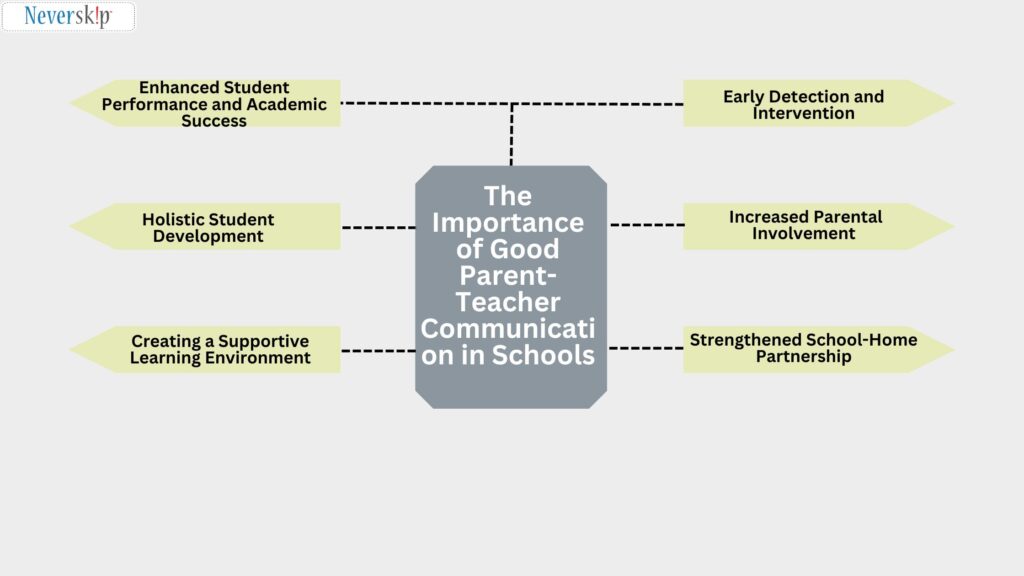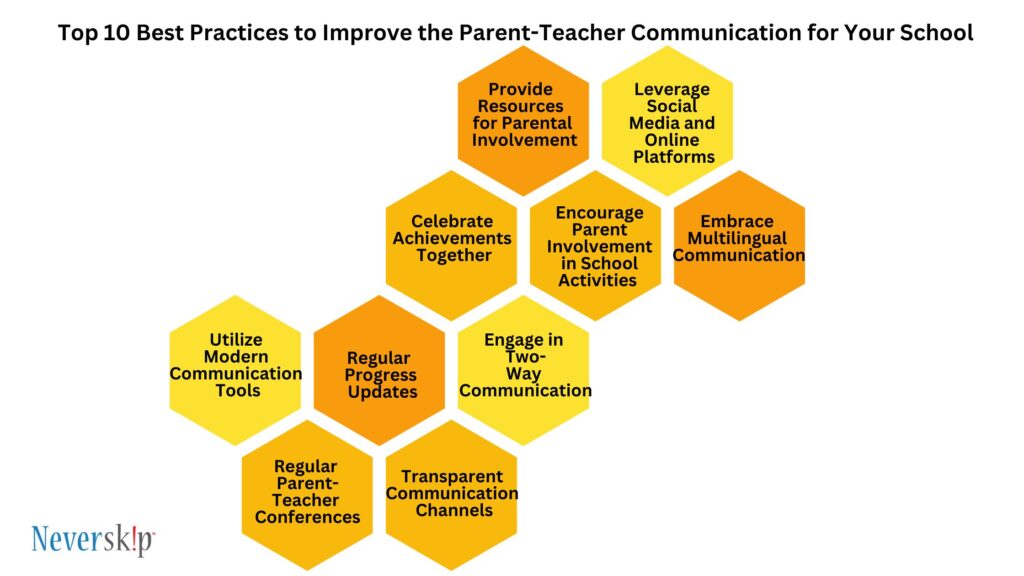Are you looking to bridge the communication gap between parents and teachers within your school? Ever wondered how enhancing parent-teacher communication could foster a more collaborative and supportive educational environment?
In today’s rapidly evolving educational landscape, effective communication between parents and teachers plays a pivotal role in nurturing students’ growth. As schools strive to provide holistic learning experiences, the demand for streamlined parent-teacher communication systems is at an all-time high.
Research revealed that one-third of the students’ families are hard to communicate with which can be overcome easily with a quality parent-teacher communication system.
Picture a scenario where parents are actively engaged in their child’s academic journey, seamlessly connected with teachers, and updated about their progress.
Such a vision transforms into reality through the implementation of robust communication strategies. This blog delves into the top ten best practices that schools can adopt to elevate their parent-teacher communication game. So, let’s get started!
The Importance of Good Parent-Teacher Communication in Schools

In an era where collaboration and information-sharing have become increasingly vital, fostering strong parent-teacher relationships is crucial for the holistic development of students. The impact of such communication extends far beyond the classroom walls, influencing academic achievement, social growth, and overall well-being. Now, let’s delve into the key reasons why good parent-teacher communication is of paramount importance in schools.
1. Enhanced Student Performance and Academic Success
When parents and teachers maintain open lines of communication, students benefit from a supportive and cohesive learning environment. Regular updates on classroom activities, assignments, and academic progress enable parents to stay informed and engaged in their child’s education.
This involvement at home can positively impact students’ motivation, study habits, and overall performance. When educators and parents work hand in hand, they can identify students’ strengths and areas for improvement, tailoring interventions to meet individual needs effectively.
2. Holistic Student Development
Effective communication between parents and teachers goes beyond academics. It provides a platform to discuss students’ social and emotional well-being, enabling a comprehensive approach to their development.
Sharing insights about students’ behavior, attitudes, and interactions with peers helps parents and teachers collaborate on strategies to address any challenges that might arise. This collaborative effort ensures that students receive consistent guidance both in and out of the classroom, nurturing their personal growth alongside academic achievements.
3. Creating a Supportive Learning Environment
A school community that values and prioritizes parent-teacher communication sets the stage for a supportive learning environment. When parents and teachers work together, students feel a sense of unity between their educational experiences at school and home.
This unity not only encourages students to take ownership of their learning but also fosters a positive attitude toward education.
4. Early Detection and Intervention
Timely identification of learning difficulties or behavioral issues is crucial for effective intervention. Regular communication between parents and teachers enables the early detection of challenges that students might face.
Whether it’s a learning disability, social adjustment difficulties, or emotional struggles, an open dialogue allows both parties to collaborate on suitable solutions. Early intervention can prevent issues from escalating, ensuring that students receive the necessary support to overcome obstacles and thrive.
5. Increased Parental Involvement
When parents are informed and engaged, they are more likely to actively participate in their child’s education. Parental involvement has been consistently linked to improved academic performance, attendance rates, and overall school success.
Effective communication empowers parents to contribute meaningfully, whether by volunteering in school activities, attending parent-teacher conferences, or supporting their child’s learning at home.
6. Strengthened School-Home Partnership
A strong partnership between schools and families is the bedrock of a student’s educational journey. When parents and teachers collaborate, a sense of shared responsibility emerges.
Schools can gain valuable insights from parents’ perspectives, leading to informed decision-making and effective curriculum planning. Conversely, parents can gain a deeper understanding of the school’s goals, values, and teaching methods, enabling them to align their support accordingly.
Also Read: Connecting Schools And Parents: The Untapped Potential Of WhatsApp Marketing
Top 10 Best Practices to Improve the Parent-Teacher Communication for Your School

As schools strive to create an environment conducive to collaboration and growth, implementing robust communication practices is paramount. Here are the 10 best practices that schools can adopt to enhance parent-teacher communication and create a strong foundation for student success.
1. Utilize Modern Communication Tools
Embrace technology to bridge the communication gap between parents and teachers. Leverage platforms such as school management systems, dedicated apps, and email to share important updates, announcements, and student progress.
These tools ensure that information reaches parents in real-time, making it convenient for them to stay informed about their child’s academic journey.
2. Regular Parent-Teacher Conferences
Scheduled conferences provide an invaluable opportunity for in-depth discussions about a student’s progress, strengths, and areas for improvement. These face-to-face interactions foster trust and allow parents to voice concerns while enabling teachers to gain insights from parents’ perspectives.
Schools should prioritize well-structured, informative parent-teacher conferences to facilitate open dialogue.
3. Transparent Communication Channels
Create a culture of transparency by offering accessible channels for parents to communicate with teachers. Establish designated communication hours, virtual office hours, or Q&A sessions where parents can seek clarification on curriculum, assignments, or any concerns they might have.
Providing clear avenues for communication cultivates an atmosphere of collaboration and shared responsibility.
4. Regular Progress Updates
Regularly update parents on their child’s academic progress, behavior, and participation. Utilize progress reports, assessment results, and feedback to provide a comprehensive overview of their development.
Highlighting strengths and areas for improvement enables parents to actively contribute to their child’s growth, setting the stage for targeted support.
5. Engage in Two-Way Communication
Encourage a two-way dialogue between parents and teachers by actively seeking input and feedback. Conduct surveys or meetings to gather parents’ opinions on various aspects of the educational experience.
Acknowledge and address concerns promptly, demonstrating your school’s commitment to collaboration and improvement.
6. Celebrate Achievements Together
Share student achievements and successes with parents to foster a sense of shared pride. Whether it’s academic accomplishments, creative projects, or extracurricular achievements, acknowledging these milestones creates a positive connection between parents, teachers, and students.
Celebrating successes reinforces the idea that the school community is a collective support system.
7. Provide Resources for Parental Involvement
Offer resources and workshops that empower parents to actively engage in their child’s learning journey. Provide tips for effective study habits, ways to support learning at home, and guidance on nurturing social and emotional well-being.
Equipping parents with tools to play an active role in their child’s education enhances the overall impact of parent-teacher communication.
8. Encourage Parent Involvement in School Activities
Invite parents to actively participate in school events, workshops, and committees. Engaging parents in extracurricular activities, fundraising initiatives, and community outreach programs fosters a sense of belonging and strengthens the school’s bond with families.
These interactions go beyond academic discussions, creating opportunities for meaningful connections.
9. Leverage Social Media and Online Platforms
Harness the power of social media platforms and online communities to extend parent-teacher communication beyond traditional boundaries. Create dedicated groups or pages where parents can receive updates, share resources, and engage in discussions.
Social media can provide a convenient way for parents to connect, ask questions, and stay informed about school events and initiatives.
10. Embrace Multilingual Communication
In diverse communities, language barriers can hinder effective communication. Provide information and updates in multiple languages to ensure that all parents can access and understand the content.
Multilingual communication in school demonstrates inclusivity and ensures that every parent feels empowered to be a part of their child’s educational journey.
Also Read: Enhancing Campus Safety: The Role Of Attendance Management Systems In Emergency Situations
The Bottom Line
In a world characterized by rapid technological advancements and ever-evolving educational landscapes, the significance of effective parent-teacher communication cannot be overstated.
As schools strive to prepare students for the challenges of the future, fostering strong relationships between parents and teachers is paramount. The collaboration between these two pillars of a student’s support system sets the stage for holistic growth, academic excellence, and a nurturing learning environment.
As the educational landscape becomes increasingly competitive, schools must adapt to meet the evolving needs of students and their families. The dynamic nature of modern education demands that schools not only impart knowledge but also cultivate skills that prepare students for a complex and interconnected world. To achieve this, seamless communication between parents and teachers is essential, allowing educators to share insights, address concerns, and collectively support students’ development.
Neverskip’s robust parent-teacher communication system emerges as a solution tailored to the demands of the 21st century. Its innovative features, including important notifications to parents, simplified communication and engagement enhancement, bulk SMS sending without character limits, easy WhatsApp integration, and messages monitoring, ensure that schools can efficiently bridge the gap between classrooms and homes.
Neverskip’s system empowers educators to effortlessly share updates, assignments, and progress reports, while also enabling parents to actively participate in their child’s educational journey.
In an era where educational success hinges on the synergy between schools and families, Neverskip’s solution offers a comprehensive platform that aligns with the needs of both educators and parents.
By leveraging this technology, schools can transcend traditional boundaries and establish a communication framework that nurtures students’ growth, encourages parental involvement, and prepares them for the competitive challenges of the future.
You can take a free demo to learn better.








